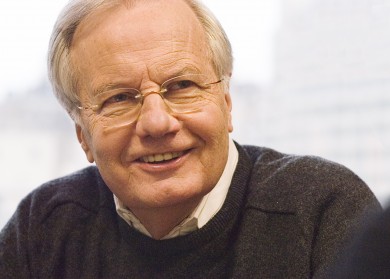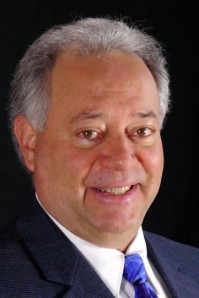Nice Above Fold - Page 378
Newsman Bill Moyers sets January 2015 as retirement date — really
Moyers, 80, has produced and anchored public-affairs programs and numerous specials on public television since 1971.Commentary: With shift in plans, Greater Public hits the brakes on digital
The departure of Jeannie Ericson from Greater Public and the cancellation of the short-lived Digital Day at the Public Media Development and Marketing Conference represent a damaging retreat from public media’s digital future. Over the past 11 years, the Integrated Media Association was one of the only focal points within public media for collaboration on digital strategy and realistic, shareable solutions for public TV and radio stations. Under the leadership of Mark Fuerst and then Jeannie Ericson, with the commitment of lots of smart people at local stations, iMA worked to bring public media into the digital age. When iMA merged with Greater Public last year, it seemed like a positive step toward integrating digital with our marketing strategies and revenue generation.In maintaining towers, stations face higher costs, lack of space
If any part of the broadcast plant ever merited the label “necessary evil,” a top nominee would be the tower. Expensive to maintain, fraught with potential hazards, bound by an ever-growing web of regulations, unloved by neighbors and often located inconveniently far away, a pubcaster’s tower still serves as the essential link between its program service and its audience. In the early years of public TV and radio — before streaming and podcasting and cable and over-the-top video delivery — pubcasters and their audiences depended completely on the reach of the signals their towers could deliver. When broadcasting was a new and developing communications medium, those towers were much easier to build.
SiriusXM cancels ‘Bob Edwards Show’, but weekly public radio show will continue
After nearly 10 years on satellite radio, “The Bob Edwards Show” will cease production after Sept. 26, when the last of the original shows airs.Public TV organizations ask FCC to protect noncoms when repacking spectrum
Three national public broadcasting organizations are asking the FCC to change its spectrum auction rules to ensure that channel repacking leaves no community without noncommercial television. The Association for Public Television Stations, PBS and CPB are concerned that repacking, or the channel shifting that will occur after the auction, could create such “white spaces.” Public television’s mission includes universal coverage, providing every American household with access to free educational television content. In a Sept. 15 petition, the organizations asked the FCC to “reconsider and revise” its auction rules based on the precedence that the agency has long recognized noncom TV spectrum as protected and distinct from commercial.CPB Board members elect Sembler and Gilbert as new leadership
The CPB Board elected new leadership Tuesday in two unanimous votes. Chairing the governing body is Elizabeth Sembler, a Florida educator, with Nevada broadcaster Lori Gilbert as vice-chair. Each will serve one-year terms. Outgoing CPB Chair Patricia Cahill presented Sembler with the chair’s gavel at the end of the board’s annual meeting in Washington, D.C. Cahill is the retired head of KCUR-FM in Kansas City, Mo., and was the first radio broadcaster elected chair. Sembler was first nominated to the board by President Bush and originally confirmed by the Senate in 2008. She was renominated by President Obama and confirmed for a second term this month.
Science Friday producer settles with government over alleged misuse of NSF funds
A for-profit corporation involved with public radio’s weekly Science Friday show has settled with the U.S. government over alleged misuse of a National Science Foundation grant awarded from August 2009 to July 2011. In the settlement announced Tuesday by the District of Connecticut U.S. Attorney’s Office, ScienceFriday Inc. and Ira Flatow, ScienceFriday’s president and host of the radio show, will pay $145,541 to resolve allegations that they mishandled NSF funds. The company also agreed to exclusion from participation in federal programs, grants and contracts until Sept. 15, 2015. ScienceFriday Inc. is a for-profit corporation based in Stamford, Conn., that produced Science Friday during the time of the contested NSF funding.Tuesday roundup: Reveal comes to public TV; new classical blogger takes the reins
Plus: A new classical station in North Carolina, and Mo Rocca's Village digs.Monday roundup: NPR stages events series, PRPD panelists reflect on conference
Plus: A Frank Zappa concert comes to light, and Nieman Lab looks at podcasting.In Tampa, college broadcasters find advantages in pubradio affiliation
The University of South Florida’s student-run radio station has forged a three-year partnership with Tampa’s WUSF Public Media to broadcast its programming as a digital multicast FM channel. The partnership, initiated this spring by student leaders of Bulls Radio, also provides mentorship and internship opportunities for USF students with the public radio station. WUSF is a full-service pubcaster also licensed to the university. It operates two public radio stations — NPR news and talk WUSF 89.7 FM and all classical WSMR 89.1 FM — as well a public TV station with four digital multicast channels. Last month, Bulls Radio began airing on WUSF’s HD 3 channel.Spoken-word contest gives students the stage to discuss the dropout crisis
American Graduate and Youth Speaks, a nonprofit that focuses on empowering youth through creativity, hope to include more young people in conversations about high-school dropout rates with Raise Up, a hip-hop and spoken-word contest that will culminate with a performance this month at the Kennedy Center in Washington, D.C., and a radio special. The organizations paired up this spring to encourage teens to submit original raps and poems related to the high school dropout crisis. By June 30, Raise Up had received over 750 video submissions, many filmed with webcams and smartphones. Twelve finalists were chosen for the contest’s next round.Mattioni to retire from WVTF, Saidi joins KCPT, and other comings and goings in public media
Rick Mattioni, who signed on at WVTF-FM in Roanoke, Va., in 1987, will retire Oct. 3 as director of programming and operations.Senate approves three Obama nominees for CPB Board of Directors
The Senate approved three members of the CPB Board Thursday, one returning and two new. The three were nominated by President Obama earlier this year. New to the governing body for a term expiring in 2016 is David Arroyo of Brooklyn, N.Y., s.v.p. for legal affairs at Scripps Network Interactive. From 2008-12 Arroyo chaired the Board of Latino Justice, formerly the Puerto Rican Legal Defense and Education Fund. He also was recognized by the Imagen Foundation as one of the most influential Latinos in entertainment in 2012. Retired dentist Judith Davenport of Pittsburgh is the other new CPB director. She is a co-founder and director of Sheridan Broadcasting Corp.,Chicago's WFMT picks up distribution of Carnegie Hall Live
PORTLAND, Ore. — Chicago’s WFMT announced Wednesday a deal with New York–based WQXR to distribute the 2014 season of Carnegie Hall Live. Entering its fourth season, Carnegie Hall Live kicks off Oct. 1 with a broadcast featuring the Berliner Philharmonker. The show is recorded and hosted by WQXR staffers in partnership with Carnegie Hall and was previously distributed by Minnesota-based American Public Media. WQXR is operated by New York Public Radio. “We’re very pleased and honored to be associated with this institution,” said WFMT General Manager Steve Robinson at the Public Radio Programmers Conference here. “Carnegie Hall is in a class by itself.PRPD, Day Two: NPR, stations prepare for debut of revised newsmag clocks
PORTLAND, Ore. — This week’s Public Radio Programming Conference is giving attendees a chance to prepare for Nov. 17, the day when new clocks for NPR’s newsmagazines take effect and both stations and the network’s news staffers will need to adjust to the revised formatting. Wednesday’s proceedings featured two opportunities for discussion. At the first, NPR representatives fielded questions from station programmers, with Chris Turpin, acting senior v.p. of news, laying out changes in store. Once the new clocks kick in, the newsmags will probably feature more shorter pieces, Turpin said. That’s partly because some show segments, such as the first segment in each hour of Morning Edition, will be longer, allowing for more pieces kept to shorter lengths.
Featured Jobs




